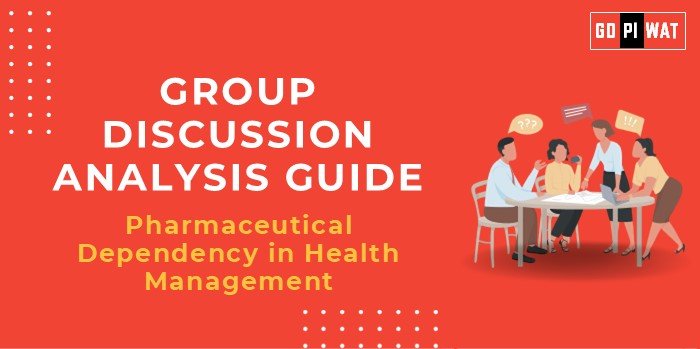📋 Group Discussion Analysis Guide
🌐 Introduction
Topic: “Pharmaceutical Dependency in Health Management”
💡 Opening Context: Modern health management often emphasizes medication, with millions relying on pharmaceuticals for managing both chronic and acute health issues. This trend raises questions about the efficacy, affordability, and long-term impact of such dependency.
📜 Topic Background: The rise in pharmaceutical use can be attributed to advancements in medical science, increased access to healthcare, and the fast-paced lifestyle of modern society. However, debates continue around whether this reliance is sustainable or if it neglects preventive and holistic health approaches.
📊 Quick Facts and Key Statistics
- 💰 Global Pharmaceutical Market: Valued at over $1.4 trillion in 2023, underscoring the industry’s rapid growth and reach.
- 💊 Medication Use in the U.S.: Nearly 66% of adults use prescription drugs regularly.
- 📈 Global Life Expectancy Increase: Improved by 6 years since 2000, partly due to better access to medication.
- ⚠️ Antibiotic Resistance: WHO reports it as a top 10 global public health threat, highlighting overuse issues.
🎭 Stakeholders and Their Roles
- 🏛️ Government Bodies: Regulate drug safety, promote affordable healthcare, and support public health initiatives.
- 💼 Pharmaceutical Companies: Develop and market drugs, contributing to both medical advances and rising healthcare costs.
- 👩⚕️ Healthcare Providers: Diagnose and prescribe medications, often following established treatment protocols.
- 👨👩👧👦 Patients and General Public: Seek quick relief from health issues, often resulting in a preference for pharmaceutical solutions over lifestyle changes.
- 💳 Insurance Companies: Influence treatment options through drug coverage policies, potentially encouraging reliance on specific pharmaceuticals.
🏆 Achievements and ⚠️ Challenges
Achievements
- ✔️ Increased Access to Life-Saving Drugs: Pharmaceuticals have made treatments accessible for diseases like HIV/AIDS, cancer, and diabetes.
- 🌟 Improved Quality of Life: Medications for chronic diseases help millions manage symptoms and maintain productive lives.
- 🧪 Technological Advances in Drug Development: Precision medicine and gene therapy are opening new frontiers.
Challenges
- ❌ Over-Prescription and Dependency: Rising cases of antibiotic resistance and opioid addiction highlight dependency risks.
- 💸 Affordability: High medication costs strain health budgets, making drugs inaccessible for low-income populations.
🌎 Global Comparisons
- 🇳🇴 Scandinavian Countries: Emphasis on preventive care and patient education has reduced pharmaceutical dependency.
- 🇯🇵 Japan: Integrates traditional medicine with modern healthcare, offering a balanced approach to health management.
📖 Case Study
🇺🇸 U.S. Opioid Crisis: Highlights the dangers of dependency on prescription medication without adequate regulation.
🗣️ Structured Arguments for Discussion
Supporting Stance: “The pharmaceutical industry has transformed healthcare by making effective treatments widely available, which has significantly reduced mortality rates.”
Opposing Stance: “Our dependence on pharmaceuticals often overlooks preventive care and lifestyle-based solutions, potentially contributing to chronic health issues.”
Balanced Perspective: “While pharmaceuticals play a vital role in healthcare, a balanced approach that includes preventive care and lifestyle adjustments is essential for sustainable health management.”
📋 Effective Discussion Approaches
- 📊 Opening Approaches:
- Impactful Statistic: Start with data on global medication usage or the economic scale of the pharmaceutical industry.
- Contrast Approach: Mention the growing use of pharmaceuticals vs. rising interest in holistic health.
- Case Study: Introduce the opioid crisis or antibiotic resistance as examples of excessive dependency risks.
- 🤔 Counter-Argument Handling: Use counterpoints like the role of lifestyle changes in reducing chronic illness or cite successful models from countries with integrated healthcare approaches.
🛠️ Strategic Analysis of Strengths and Weaknesses
- 🔑 Strengths: Accessibility of effective treatments, contribution to increased life expectancy, pharmaceutical innovation and advancements.
- ⚡ Weaknesses: Risk of addiction and overuse, high medication costs, environmental impact of pharmaceutical waste.
- 🌟 Opportunities: Promotion of preventive care alongside medication, development of cost-effective drugs for low-income populations.
- ⚠️ Threats: Rising resistance to antibiotics, dependency culture diminishing lifestyle improvements.
📚 Connecting with B-School Applications
- 💼 Real-World Applications: This topic can be linked to discussions on healthcare management, ethical pharmaceutical marketing, and public health policy in B-school.
- 🎓 Sample Interview Questions:
- “How would you address the rising costs of pharmaceuticals while maintaining innovation?”
- “What role do preventive health strategies play in modern healthcare?”
- “Do you think healthcare providers are incentivized towards a pharmaceutical-centric approach?”
- 💡 Insights for B-School Students: Consider the balance between profit and ethics in healthcare, the role of preventive health in reducing pharmaceutical dependency, and how healthcare innovations might change the dependency paradigm.


